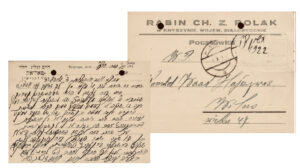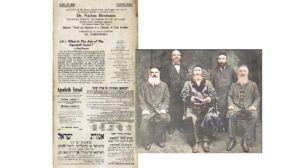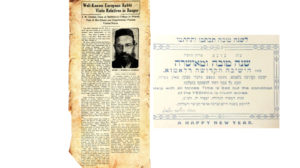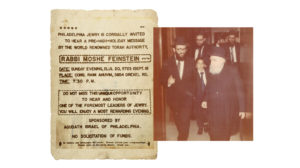Under Age
| December 2, 2020Was the charismatic, elderly Frenchwoman a supercentenarian or merely a super-fraudster?
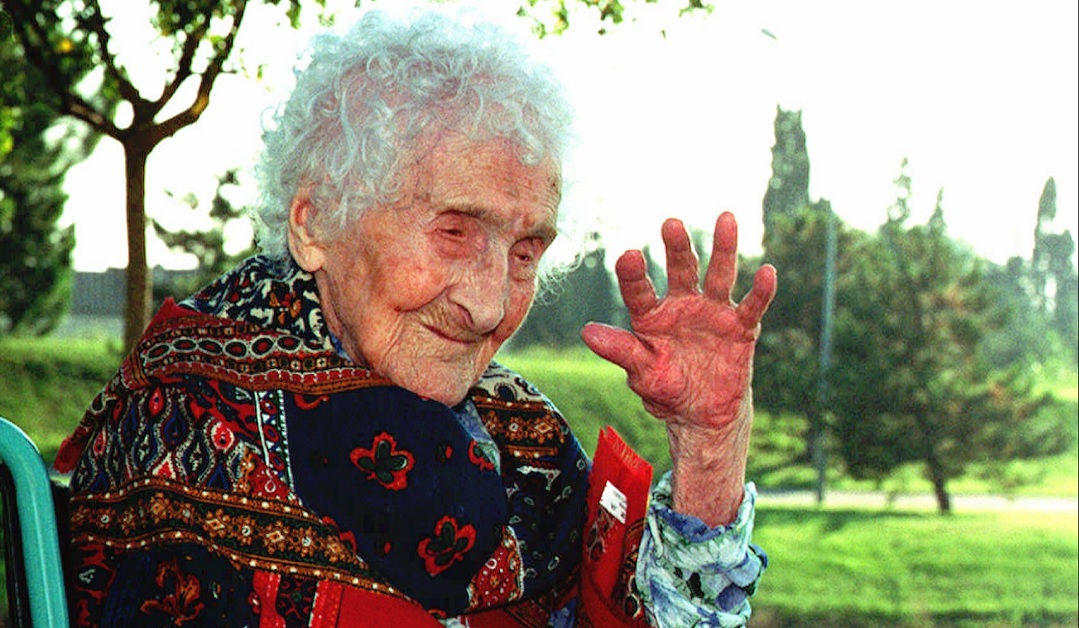
Image: APImages.com
I
n the summer of 1997, Jeanne Calment became a celebrity. That was the day of her death, and the day she passed all the world records for longevity. For 122 year, five months, and 14 days, Jeanne Calment managed to evade the malach hamaves.
In the 23 years since her passing, and during the last decades of her life, researchers have been intrigued about uncovering the secret to her exceedingly long life. Calment was born on February 21, 1875, to prominent residents of the town of Arles Bouches-du-Rhône, Provence. Her father, Nicholas, was a well-to-do shipbuilder, and her mother, Mary, came from a family of millers.
Jeanne lived a graced childhood, according to her biographer, Georges Garoyan, and a team of researchers who interviewed Calment extensively in her later years. Every morning after a cup of hot chocolate, she would head off to school accompanied by the family maid. When the morning session was over, her father would bring her home for lunch, share a companionable meal, and return her to school in time for the afternoon sessions.
Despite her upbringing in a society where little girls were expected to be demure and beribboned, Calment loved the outdoors, and spent a lot of time on her father’s farms in Saint Martin de Crau and Paradou. At 11, like other French mademoiselles her age, Calment progressed to college (high school), graduating at 16. After her graduation, as going to work didn’t enter the equation, she spent her time painting and playing piano.
When she was 21, Calment married Fernand Nicolas Calment, her second cousin twice-over. Their paternal grandfathers were brothers, and their paternal grandmothers were sisters. After her marriage, she transitioned from a life of ease at her parents’ home to a life of ease with her husband. Fernand was the heir to a prosperous drapery business, “Nouveautés,” located in the center of Arles, and the couple moved into a spacious apartment built above it. Jeanne employed servants to run her home, while she proceeded to lead a strenuous, outdoorsy lifestyle. She indulged in fencing, cycling, tennis, swimming and even roller-skating, even though, as she later recalled, “I fell flat on my face.” She also played piano and held music-making sessions with her friends.
In the summer, the couple would go glacier mountaineering, and hunting in the hills of Provence. As her proficiency with the rifle improved, Calment found that she enjoyed hunting tremendously, and soon joined an all-male hunting society. After a while, she would lead the men on their hunting expeditions. They playfully called her “Jean” — the masculine version of her name — or “Mme. Partridge.”
Their only daughter, Yvonne Marie Nicolle, was born in 1898. When Yvonne was 28, she married Joseph Billot, an army officer. She gave birth to their only son, Frédéric, later that year.
But on the day that Jeanne should have been stringing streamers for Yvonne’s 36th birthday in 1934, she found herself instead accompanying her daughter on her final journey. After a stretch of tuberculosis that had been treated at various sanatoriums, Yvonne passed away from pleurisy, a respiratory complication of the disease. The grieving grandmother raised young Frédéric, who lived with his father in a neighboring apartment.
The storms of World War II seem to have bypassed the wealthy matron with nary a ruffle. She later claimed that German soldiers had slept in her rooms but that she wasn’t angry with them, as they had not stolen anything.
In 1942, her husband, Fernand, passed away at age 73, apparently after eating a quantity of chemically-tainted cherries. While her grandson, Frédéric, eventually married and moved next door, by 1963 all her relatives had passed away — her brother François died in 1962 at the age of 97, her son-in-law, Joseph, died in January 1963, and her grandson died in a car accident a few months after that.
In 1965, 90 years old with no heirs left, Calment put up her apartment for “en viager” sale — a life estate contract selling the property in exchange for a right of occupancy and a monthly revenue. She signed the deal with her attorney, notary public André-François Raffray, for 2,500 francs (€380) a month, until her death. Raffray probably assumed his client would die within five years maximum, but 30 years later, in 1995 when he died, he’d already paid her more than double what the apartment was worth — and his family had to continue making payments until her death two years later. When her interviewers asked about the arrangement that netted her a surprise fortune, she reportedly commented, “In life, one sometimes makes bad deals.”
Finally, a Celebrity
After the deaths of her nearest and dearest, Calment led a quiet, almost reclusive life. Even on the occasion of her 100th birthday, she politely refused the traditional gestures of the Arles mayor for gifts and a public celebration.
“Mme. Calment wanted no ceremony: no drums, no trumpets, no presents, no cake,” the mayor told the press in February 1975. “She was assured that no one would know about her centennial. Only then did Jeanne agreed to come to City Hall herself. I waited for Jeanne for a long time in the reception area until it became clear that one of the sitting women, who hardly looked 80, was the hero of the day.”
Ten years later, Calment’s water pipes froze — she never bothered with heat — and she developed frostbite in her fingers. It was then that she realized the prudence of living in the company of other people and decided to make the move to the “Maison Du Lac” nursing home.
Once at the home, her attitude to publicity abruptly changed. She was “discovered” by the press and repeatedly interviewed by fascinated reporters.
“I waited 110 years to be famous. I mean to make the most of it,” she was reported to have said. Blessed with impressive stamina, she followed a strict daily schedule. She instructed the nurses to wake her every morning at 6:45 a.m., whereupon she rose and offered a long prayer expressing her joy at being alive. Wearing a stereo headset, she followed an energetic routine of chair-based exercises. Nurses noted that she moved faster than other residents 30 years her junior. Calment would wash unassisted, her self-care regimen culminating in applying olive oil and powder to her complexion.
She made herself daily fruit salads with bananas and oranges but also reveled in chocolate (that indulgence never seemed to affect her though — she was a petitie woman who weighed about 100 pounds). After her midday meal, she smoked a Dunhill cigarette (a habit adopted years earlier to ward off migraines) and enjoyed a glass of port. She would nap for two hours in the afternoon and then make the rounds of her friends in the facility, updating them on the latest news she had heard on the radio. In the evening she would have a quick supper, return to her room, listen to music, smoke a last cigarette, and be in bed by 10:00 p.m.
But even for the seemingly invincible Calment, a fall and fracture at age 114 put her in a wheelchair, her daily routine all but abandoned. Still, she hung on for another eight years, although the year before her death, she was already in steep decline. “I wait for death… and journalists,” she told a reporter, although by then she was largely sight and hearing impaired. She finally succumbed on August 4, 1997.
The Switch
If you plot the ages of people who lived to see their 100th birthday on a scatter-graph, Calment’s incredible 122 years would be what is mathematically known as an “outlier,” an observation that lies way outside the overall pattern of a distribution. Her lifespan measures several years longer than the next oldest people ever documented (where the differences are usually by months or even weeks).
This statistic both amazed and puzzled researchers, although her own family members had extreme longevity — her father died at 97, her brother at 93. Still, there were skeptics, and rumors: Perhaps Jeane Calment wasn’t really 122 at her death? Or perhaps, the person said to be Calment, who was born in 1875, wasn’t who she claimed she was?
A few years ago, a pair of Russian researchers, gerontologist Valery Novoselov and mathematician Nikolay Zak, began to look for proof of an old yet revolutionary theory: Perhaps Jeanne Calment was the one who actually died in 1934 and her daughter Yvonne assumed her mother’s official identity. That would have made Jeanne/Yvonne 99 years old when she died in 1997, and not the record-setting 122.
The idea began to circulate when Laure Meusy-Defousset, former head of the Maison du Lac, reported that one of the staff at the nursing home said her grandmother had worked in the Calment household and had claimed that Yvonne had taken the place of Jeanne.
Zak published his research in a 2018 paper, Jeanne Calment: The Secret of Longevity, their theory based on past rumors, photographs, interviews and documents. Their first clue was that, as so many women secretly desire, Jeanne Calment did not look her age. Her caregivers at the nursing home observed that she moved faster than residents decades her junior. And at her centennial celebration, the mayor of Arles said she didn’t look more than 80.
To obtain an objective assessment of Calment’s apparent age, Novoselov decided to conduct a poll on his Facebook page, requesting participants to estimate the age of the “the lady on the photo.” It was a photo taken by journalists during the celebration of her 117t birthday. Novoselov was amused to find that the average estimate was 95 — the age Yvonne would have been had she lived. Novoselov also noted that Calment had no signs of senile frailty, which is common in people over a 100 years of age.
Another suspicious clue was Calment’s request from a relative to burn all her old photos, following a request from the Arles archives to submit her memorabilia for posterity. Stuck in the nursing home, Calment couldn’t carry out the job herself, but resorted to the help of a relative.
But French gerontologist Jean-Marie Robine and Michel Allard, two researchers who devoted themselves to interviewing Calment and researching her claims admitted, “That’s a bit surprising, yet, this attitude is not so unusual. Many people in her situation, without direct descendants or close friends, decide, in the twilight of their lives, to leave nothing ‘dragging’ behind them — nothing that affects them, no trace of their existence… Jeanne would say, ‘I don’t want my image scattered.’ “
Although Calment succeeded in destroying many of her family photos, there are pictures of the younger Jeanne and Yvonne still extant. Comparing pictures of the elderly Calment to early photos of Jeanne and Yvonne, and carefully analyzing her chin, jawbone structure, and right ear, not to mention general resemblance, longevity activist Yuri Deigin concluded that the lady in the nursing home was more likely to be Yvonne. This was confirmed by a facial recognition program called Amazon Rekognition. The algorithm identified two photos of Yvonne and a supposed photo of Jeanne as photos of the same person.
There are other physical discrepancies. On Jeanne’s old ID card, issued many decades ago, her eye color is listed as black, but in photos of the supercentenarian, they are clearly gray-green. On average, by the age of 80, women experience a height decrease of about six centimeters. Calment’s height at 114 was only two centimeters less than the height noted on the same identity card. But we know that Yvonne, as evidenced from photographs in which she and her mother are shown together, was taller than Jeanne to begin with.
According to the 1954 and 1964 Arles Census, Joseph Billot, Yvonne’s widower, is listed as living together with Calment (they lived in adjacent apartments on the Calment business property). Calment seems to have been an extraordinary mother-in-law who got along with Billot splendidly as they co-raised Frédéric. But their living in the same complex seems to be a bit extreme — unless of course, she was actually Yvonne and they were lawful husband and wife.
There were other telling clues in the interviews conducted toward the end of Calment’s life that Zak and his colleagues pounced on for more proof that Jeanne was actually Yvonne. For example, when the interviewers asked her the name of her family’s maid, she mentioned the name of a woman who, according to the 1911 census, lived with the Calment family — Jeanne, her husband and Yvonne. And this woman, according to records, was ten year’s Jeanne’s junior.
Calment’s memories of her piano teacher were also questionable. She mentioned the name of her first piano teacher when she was seven, but this woman, who was a well-known music teacher in Arles, was only seven years older than Jeanne — making it more likely that she was actually Yvonne’s teacher. And when Calment was asked in an interview, “Did you ever meet Frédéric Mistral?” (Mistral received the Nobel Prize in Literature in 1904.) she responded, “Yes! Yes, he was a friend of my father… wait, he was a friend of my husband.”
But all this cloak-and-dagger speculation begs one basic question: Other than faking a world record — which she could not have known she would achieve back in the 1930s — what could have been Yvonne’s motive for taking on her mother’s identity?
Too Late to Extricate
Zak’s colleague Yuri Deigin believes the initial motive was financial. He claims that Yvonne and her father were trying to avoid inheritance tax when Jeanne passed away in 1934. According to French inheritance law at the time, even inheritance between spouses was taxed, which means that, speculating Jeanne had her own substantial assets that she’d inherited from her wealthy father, upon her death there would be a hefty tax that Jacques Calment would have to pay. It would also mean that he’d have to pay considerable tax on his large store, and this could well have become a motive for an identity switch, especially considering that just three years later, the store closed — which means that in 1934, it could already have been on the edge of bankruptcy, and those extra taxes could well have pushed it over the edge.
They also discovered that a state insurance company, Caisse Nationale de Prévoyance, paid a generous lifetime annuity to Jeanne Calment, which would cease upon her death. This could be another financial motive for the switch.
In a more recent article however, penned at the beginning of 2020, Zak proposed a scenario that was not motivated only by money. As he admits, “Faking your own death and assuming your mother’s identity is a drastic action. To do this for money alone is unlikely unless it could save them from a very difficult financial position.” Even if the store was on the verge of insolvency, there was plenty other money around from their very well-heeled family.
It is well-documented Yvonne fell ill with pleurisy, an infection that resulted from her bout with tuberculosis. Zak suggests that Jeanne too, fell ill with tuberculosis at the same time as her daughter, but while Yvonne quickly recovered and returned home, Jeanne’s malady dragged on. Tuberculosis, being a heavily stigmatized illness, prompted the Calments to keep both mother’s and daughter’s episodes a secret. But how to explain Jeanne’s prolonged absence? In Yvonne’s case, it would be easy, she had been travelling with her husband, Joseph Billot, for some time. Yvonne therefore decided to assume her mother’s identity for a while, just to cover up for her until she returned home, restored to full health.
Part of assuming Jeanne’s identity entailed signing documents, and it’s likely that Jeanne was required to sign various documents in Arles in connection with her finances or property transactions. Some signatures may have required ID for authentication. Yvonne proceeded to obtain an ID card in her mother’s name — using her mother’s passport to validate it. The new ID card displayed an old snapshot of Jeanne but an imitation signature inscribed by Yvonne. Using this card, Yvonne was able to forge all the necessary signatures, in place of her ailing mother.
Although this sequence of events remains unproven, a copy of such an ID card does exist. Jeanne’s passport was probably used as the source for the details, which were copied directly. For example, as mentioned, Calment’s eye color was recorded as black, while the supercentenarian’s actual eye color was green.
Just as Yvonne had recovered, she assumed that her mother would too. She certainly didn’t expect to gain anything from her signature forgeries — they just maintained the secrecy surrounding Jeanne’s condition. She probably assumed that the identity switch could be quietly and painlessly reversed when her mother returned home. But it was not to be. According to this theory, it was in fact Jeanne’s tuberculosis, not Yvonne’s, that suddenly degenerated into pleurisy and her condition rapidly declined. She had to be brought back to Arles.
No More Options
Yvonne was now in a quandary. Notaries who had seen her sign documents in Jeanne’s name would know her as her mother. They had no time to suddenly spread the news that Jeanne was deathly ill. Not only that, she would look different from Yvonne who was currently known as Jeanne. They could not admit that the woman who had returned home was the real Jeanne because Yvonne’s duplicity and faked signatures would be exposed. If people found out, it would mean a full-blown scandal. Yvonne simply could not revert to her real identity.
This left the Calments with no other option. When Jeanne succumbed to her illness, they had no choice but to publicize that it was Yvonne who had died. After Jeanne’s death had been recorded as that of Yvonne in front of all the witnesses at the funeral, there was no way that Yvonne and her family could extricate themselves from the web of lies she had woven.
Arles, though, is a small town. Wouldn’t the local folks recognize that the woman who was living in Jeanne’s house and assuming her identity was in fact her daughter? Zak and his co-author, Philip Gibbs, postulate that because tuberculosis can cause swelling of the parotid gland so that cheeks become flabbier, Yvonne, who looked startlingly like her mother, aged considerably after her illness. And, as they write, “Jeanne was rarely seen in Arles between 1927 and 1935, while Yvonne was absent from 1930 to 1931. When Yvonne was seen after about 1932, her gray hair [a side effect of the TB] meant that she was mistaken for Jeanne by anyone who did not know her well… Only a few close family members had to be aware of the switch.”
But what about little seven-year-old Freddy? Wouldn’t he have recognized his own mother in place of Jeanne? Zak and Gibbs claim that for much of his young life, both Yvonne and Jeanne would have been away from Arles, either traveling or being treated in sanatoriums. And mother and daughter looked very much alike. A little boy’s imagination would have to be extremely active to even imagine the idea of a switch.
Zak’s and Gibbs’ theory is an interesting and imaginative one — but other than the ID card, can they offer any hard evidence for it? They claim the very proof is in the signatures Yvonne was trying to forge. A sampling of “Jeanne’s” signature over time, gathered from documents spanning from 1896 until 1992, show more than just typical changes that come with age. They say that during the 1930s, the initial “J” slightly changes shape, while the final “t” loses its underline tail. For the next 40 years after the 1930s, the signature changes naturally do to aging.
Supposing the switch did take place: Jeanne died in 1934 while Yvonne went on to “live” until 122. Is it reasonable to assume that André-François Raffray, a lawyer who was close to the family, never got wise to it? The annuity was calculated according to the life expectancy of a 90-year-old French women in 1965, which was around three years. Did he really go on paying ten times that without suspecting something awry?
Zak suggests that even if Raffray realized the ruse, Yvonne could have bought his silence by quietly refunding him, she would also have had the ability to do so. And perhaps, since he was friendly with Yvonne, they signed the deal (along with the understanding that his payments would be covertly returned) precisely to make the identity swap seem less plausible to the wider world, and less likely to be investigated by those who would have suffered financially from it.
Case Dismissed
French gerontologist Jean-Marie Robine, one of Calment’s validators, told a French newspaper last year that although he’d heard about and even considered the switched-identity theory when Calment was still alive, he dismissed it, claiming that during his interviews Calment had correctly answered questions about things that her daughter could not have known about. He further doesn’t believe that the townsfolk of Arles could have been duped by the switch. Michel Allard, the second doctor who helped verify Calment’s records, said that the team had considered the identity switch theory back in the 1990s because of how young she looked and acted, but contends that similar discrepancies in the rates of aging are commonly found in families with centenarian members. As the researchers told the Washington Post, “Statistically improbable is not the same thing as statistically impossible.”
The discussion, more than two decades after Calment’s passing, is still one of intrigue and international speculation. In a meeting of the National Institute for Demographic Studies in Paris in January 2019, French, Swiss, and Belgian longevity experts concluded that while further research would be launched, the Russian claimants’ proofs were spotty at best.
But who will ever know? Perhaps Jeanne (Yvonne?), receiving all the homage at Maison du Lac in her last years, may have been hinting to her duplicity all along. As she told reporters on one of her last birthdays, “The Merciful G-d has missed my name. And now He’s not remembering me anymore. Merciful G-d forgot me…” Perhaps she was just questioning her longevity. On the other hand, could she have been referring to how her real name had simply disappeared?
Later she told reporters, “I think I’m going to die laughing, it’s part of my program…” Either way, Jeanne Calment surely had the last laugh.
(Originally featured in Mishpacha, Issue 838)
Oops! We could not locate your form.

